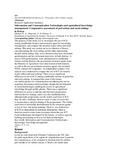| dc.description.abstract | The purpose of this study was to investigate the use of ICTs
among smallholder farmers and extension agent for knowledge
management, and compare the situation in peri-urban and rural
settings. The study was carried out in two districts of Kenya,
one representing the rural setting and the other representing
the peri-urban setting. Data were collected using semi-structured
questionnaires and key informant interviews in both districts. A
total of 200 questionnaires were administered to smallholder
farmers in both districts; the government extension agents from
the Ministry of Agriculture were interviewed in both districts,
as well as the non-government extension agents who included
NGOs, and private companies. An independent samples t-test
analysis was conducted to compare the use of ICT for farmers
in peri-urban and rural settings. There was no significant
difference in use of ICTs among smallholder farmers in periurban
and rural settings. It emerged that most of the famers
use mobile phones for communication and sharing but not for
acquiring information and knowledge, despite the development
of recent technologies enabling the access of agricultural
knowledge through mobile phones. There was a significant
difference in access to internet and television programmes
between the two settings, and it was also established that
although radio programmes are the widely used form of ICT,
they are still a challenge when it comes to ease of access due
to inconsistency and poor timing of the programmes. The widely
used form of knowledge dissemination by the extension agents
is face to face, and group meetings. There is very limited use
of ICTs to disseminate in extension information. There is
therefore need to create more awareness about the new ICT
based technologies developed for the famers, as well as capacity
building and training on how to use these technologies. | en |

